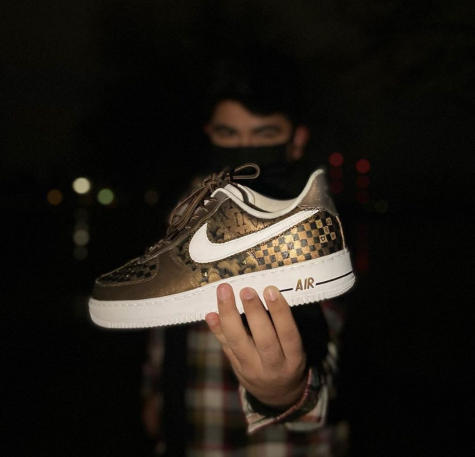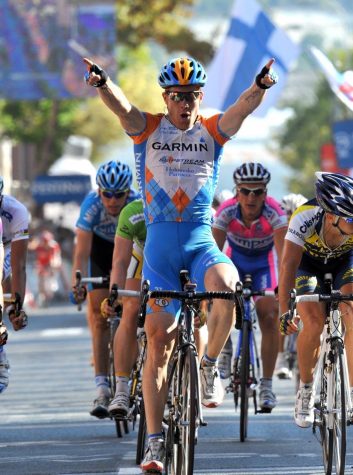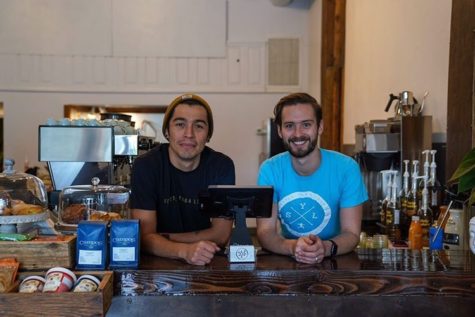Journey from geology to teaching
WHS math teacher Tom Alexander
While spending six months in Europe, math teacher Tom Alexander met a traveler from Canada while he was in Greece and they decided to hike 7,000 feet up a mountain on the island of Crete.
The two separated for a short time while Alexander went to find a route and they planned to meet at a certain spot.
“I left my pack so she would see it,” Alexander said. “I found a route and I came back. My pack was there [but she wasn’t].”
Alexander suddenly became worried and began searching for her, but couldn’t find her tracks.
“I was like ‘Oh crap, she must have fallen into one of these gullies,’” Alexander said. “I spent the rest of the afternoon searching for her body… [but] it was getting dark and I decided I better start heading down.”
At the bottom, Alexander finally found one of the woman’s boot prints, she had crossed back to town. He headed to the bus station and found her there waiting for him.
“She knew that’s where I was headed,” Alexander said. “We just missed each other somewhere along the way, but I was so scared, I thought she was dead.”
This was just one of the numerous adventures that Alexander’s love for the outdoors led him to. He enjoys many outdoor activities like mountain biking, nordic skiing, and kayaking.
“It just puts me in a good space,” Alexander said. “I like being outside… and this is an awesome place. It’s a great part of the country to ride bikes in.”
One of his favorite quotes is: “I spent half my life riding bikes and the other half I wasted.”
Alexander also loved to surf when he was young and after graduating from Andrew Jackson High School in Portland in 1968, he moved to Hawaii for a year.
He returned to Portland in 1971 to attend Portland State University, but he shifted in and out of school while he worked and in that time, he went on three expeditions to Alaska. He went back to school “seriously” in 1988 and graduated in 1992 with a degree in geology.
He then spent 15 years in the mining industry as both a statistician and a mine geologist.
“I got to make an estimate,” said Alexander. “Then the miners would go mine the ore and I got to see if my estimates were accurate or not. It’s kind of like weather forecasting, but with rocks.”
Alexander said he had originally intended to get a teaching certificate, so he could become a science teacher, but he ended up with a geology degree because he had more credits toward it and he got more enjoyment out of those classes.
“I had thought about that [becoming a teacher] actually when I was in high school,” Alexander said. “I was convinced I could do better than some of the teachers I had and I like kids.. I really like kids with a sense of humor.”
Alexander also said he had a number of relatives who were teachers so that was always “in the conversation.”
After working in the Cannon Gold Mine in Wenatchee for 10 years, the mine closed down and Alexander went back to school and earned a teaching certificate from Central Washington University.
After teaching for two years, a former boss who was the exploration manager for a company in Idaho, offered Alexander a job in northwestern Argentina. So Alexander took a two-year leave of absence from teaching and went to Argentina with the idea that if the mine developed he would be the project geologist.
“It wasn’t like an adventure,” Alexander said. “It was business. I sat at a computer and watched numbers go by all day.”
He returned to his teaching job and settled in Wenatchee to provide his daughter with a more stable life.
Alexander’s students say he incorporates a lot of humor into his teaching and the students in his AP Statistics class keep a running list of his funniest quotes.
He said he wasn’t always great at math and that there are so many more resources for kids to take advantage of now.
“When I was in high school, we didn’t have the push or the different pathways to get through the curriculum,” Alexander said. “We have so many more opportunities now [and] it’s not as easy to get lost. And because we [WHS] are so big, if you’re a little weird, you’re going to find someone you can relate to.”
He is now in his 16th year of teaching.
“I try to encourage my students to get a career where they will be thinking,” Alexander said. “Having a job where you get to think and solve problems is great, it can be really stimulating.”






